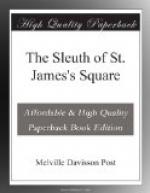The Arabian formula fitted snugly to the facts.
The great Dominion railroad, extending from Montreal into New York, was having a run of terrible luck; one frightful wreck followed another. Nobody could get the thing straightened out. Old Crewe, the railroad commissioner of New York, was relentless in pressing hard conditions on the road. Then out of the West, had come young Clinton Howard, big, tawny, virile, like the race of heroes. He had cleaned out the tangles, set the thing going, restored order and method; and the confidence of Canada was flowing back. Then Howard had made love to Marion in his persistent dominating fashion . . . . and here, with her whispered confession, was the fairy story ended.
Marion pointed her finger out north, where, far across the valley, a great country-house sat on the summit of a wooded hill.
“Clinton has discovered the Commissioner’s secret, Sarah,” she said. “The safety of the public isn’t the only thing moving old Crewe to hammer the railroad. He pretends it is. But in fact he wishes to get control of the road in a bankrupt court.”
She paused.
“Crewe is a Nietzsche creature. Victory is the only thing with him. Nothing else counts. The way the road was going he would have got it in the bankrupt court by now. He’s howling `safety first’ all over the country. `Negligence’ is the big word in every report he issues. It won’t do for Clinton to have an accident now that any degree of human foresight could have prevented.”
“Well,” I said, “the dragon will give the hero no further trouble. Dr. Martin told mother to-day that Mr. Crewe’s mind had broken down, and they had brought him out from New York. He got up in a directors’ meeting and tried to kill the president of the Pacific Trust Company, with a chair. He went suddenly mad, Dr. Martin said.”
Marion put out her hands in an unconscious gesture.
“I am not surprised,” she said. “That sort of temperament in the strain of a great struggle is apt to break down and attempt to gain its end by some act of direct violence.”
Then she added:
“My grandfather says in his work on evidence that the human mind if dominated by a single idea will finally break out in some bizarre act. And he cites the case of the minister who, having maneuvered in vain to compass the death of the king by some sort of accident, finally undertook to kill him with an andiron.”
She reflected a moment.
“I am afraid,” she continued, “that the harm is already done. Crewe has set the whole country on the watch. Clinton says there simply must not be a slip anywhere now. The road must be safe; he must make it safe.” She repeated her expression.
“An accident now that any sort of human foresight could prevent would ruin him.”
“Oh, dear, it’s an awful strain on us . . . on him,” she corrected. “He simply can’t be everywhere to see that everything is right and everybody careful. And besides, there’s the finances of the road to keep in shape. He had to go to Montreal to-day to see about that.”




